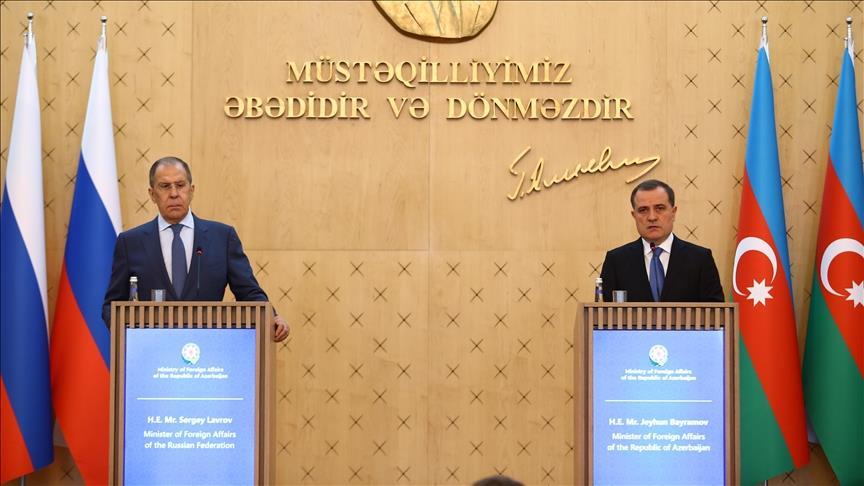Russian Foreign Minister Sergey Lavrov said Tuesday that the settlement of the Nagorno-Karabakh conflict will allow the unlocking of the region’s high transit and economic potential, which had been blocked for years.
Speaking at a news conference in the capital Baku following a meeting with his Azerbaijani counterpart Jeyhun Bayramov, Lavrov said Russia will further undertake comprehensive steps aimed at supporting the cease-fire in the region.
'We spoke in detail about the progress in the Nagorno-Karabakh settlement. We have a shared opinion that the key to further normalization in the region is adherence in full to the agreements reached by the leaders of Russia, Azerbaijan and Armenia on Nov. 9 last year and Jan. 11 this year.
“These agreements provide all the necessary mechanisms to support the cessation of all hostilities and are aimed at unblocking transport and other links. This situation has been hampering the high transit and economic potential of this geopolitically important region for years,” he said.
For his part, Bayramov slammed Armenia’s unwillingness to share mine maps, saying 22 Azerbaijanis were killed by explosives planted during the occupational period.
'We see this trend as dangerous and we are watching it carefully. We're ready to turn the current page. Since the occupation situation is over, we can talk about normalizing relations with Armenia. Azerbaijan is taking steps in this direction,' he said.
Relations between the two former Soviet republics of Armenia and Azerbaijan have been tense since 1991, when the Armenian military occupied Nagorno-Karabakh, also known as Upper Karabakh, a territory internationally recognized as part of Azerbaijan, and seven adjacent regions.
When new clashes erupted on Sept. 27 last year, Armenia launched attacks on civilians and Azerbaijani forces and even violated several humanitarian cease-fire agreements.
During the six week-conflict, which ended with a Russian-brokered truce, Azerbaijan liberated several strategic cities and nearly 300 of its settlements and villages from Armenian occupation. The two countries signed a Russian-brokered agreement on Nov. 10 to end the fighting and work toward a comprehensive resolution.
A joint Turkish-Russian center was established to monitor the truce. Russian peacekeeping troops have also been deployed in the region.
- Russia, US cannot agree on agenda of Putin-Biden meeting
Asked about a possible meeting between Russian President Vladimir Putin and his US counterpart Joe Biden, Lavrov said there is no news about it and even the agenda of such a meeting has not been drafted yet.
According to Lavrov, the Russian side suggested giving top priority to issues of global security because Russia and the US bear particular responsibility for maintaining stability as the two biggest nuclear powers.
However, the US side does not seem interested, he said.
'They first said that the presidents should meet without any preparation and determine the main directions of our further work. Then they mentioned that it might be better for the experts to meet before the summit. In general, there is a lot of uncertainty here, and with a generally positive attitude to this initiative, we are studying all aspects related to it,' he added.
By Elena Teslova
Anadolu Agency
energy@aa.com.tr


